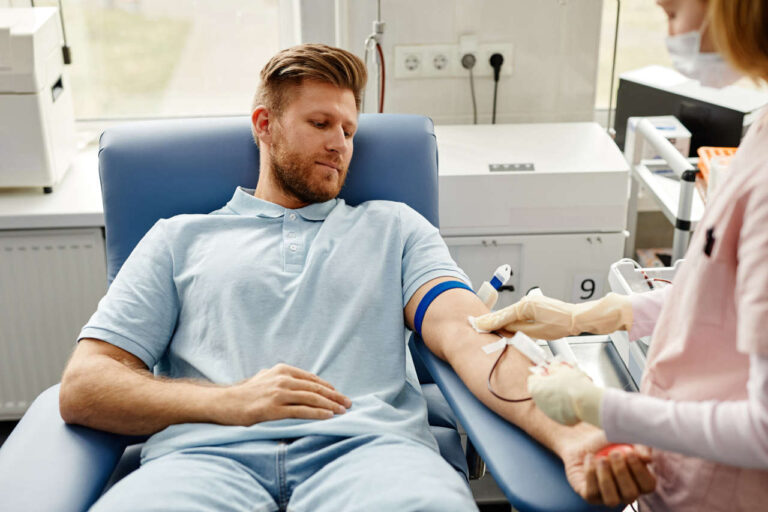
As we age, the chances of becoming ill increase, and often, it can be difficult to determine the specific causes of our deteriorating health. Getting tested for various immunoglobulin biomarkers is one of the best ways to find out what is going on inside our bodies.
Biomarkers are specific molecules in the body that increase or decrease depending on the disease state. Biomarkers will allow the practitioner to narrow down the possible diagnosis for the patient being seen.
In most cases, signs and symptoms generally work well in identifying a disease. Biomarkers, however, can aid as a strong lab reference point to help pinpoint a specific illness. Combined with signs and symptoms, the practitioner can then select the most appropriate drugs to effectively treat the diagnosis in question. Comparative analysis of markers can also diagnose probable recurrent infections.
Get IVIG Prior Authorization
What Are Immunoglobulin Levels?
There are five primary classes of immunoglobulins. This includes IgG, IgA, IgM, IgE and IgD. We will only focus on IgG for this article. IgG is an immunoglobulin that is secreted by plasma cells in the body. As we age, the level of our IgG changes. The measuring of IgG levels has revolutionized our take on several diseases. Not only are the levels effective in diagnosing a condition, but they also play a role in tracking a patient’s state of health during treatment.
Significance of Normal Levels of IgG
The level of circulating serum immunoglobulin G can help reveal valuable information regarding a specific disease. Several diseases are diagnosed with IgG levels in the blood.
For example, IgG levels are recently being used to detect diabetes in children and also assist in diagnosing resistant malaria. In addition, IgG levels can forecast a heart attack before it may occur. IgG levels can also be helpful for the diagnosis of COVID-19.
If you are suffering from a chronic disease, measuring IgG levels and comparing them with the normal range of serum immunoglobulin G levels by age can help you pick the best possible drugs and minimize long-term damage to your health.
Normal IgG Levels by Age
A great deal of research has been done regarding what normal levels of IgG should be. Several notable diagnostic labs pay close attention to such studies and base their services upon them. The normal level (or reference value) is used as a reference point by doctors to help diagnose a particular disease.
An adult should have an IgG level of 600-1600 mg/dl. Whenever IgG testing is done for diagnosis, medical professionals must keep the patient’s age in mind before drawing any conclusions. The patient should also be tested for normal IgG subclass levels by age. Levels are determined by conventional serum protein electrophoresis.
Get IVIG Copay Assistance
Speak to a SpecialistHere are the reference values for different age groups, according to Exeter Clinical Laboratory:
| Age | IgG level |
| 0–2 weeks | 500–1700 mg/dl |
| 2–4 weeks | 390–1300 mg/dl |
| 1–3 months | 210–770 mg/dl |
| 3–6 months | 240–880 mg/dl |
| 6–9 months | 300–900 mg/dl |
| 9–12 months | 300–1090 mg/dl |
| 1–2 years | 310–1380 mg/dl |
| 2–3 years | 370–1580 mg/dl |
| 3–6 years | 490–1610 mg/dl |
| 6–15 years | 540–1610 mg/dl |
| >16 years | 600–1600 mg/dl |
How Does Age Affect the Levels of IgG?
Research has proven that IgG levels vary with age. Researchers showed that the normal total IgG level of healthy individuals in the serum was high in the newborn period, followed by a decrease for several months. After that, the levels begin to rise, reaching the maximum level at around 18 years of age.
What To Do If Levels Are Not Normal
Deviation from the norm can occur on either side of the spectrum. A person can suffer high IgG levels as well as low IgG levels, although high levels are seen less frequently.
High levels of IgG can cause unexpected issues. It is usually related to underlying immune system disorders or an abnormal response to invading germs.
If your IgG level is high, there is an increased chance of having one of the following conditions:
- Anemia
- Respiratory infections
- Skin infections
- Fungal infections
- Autoimmune disorders
A low level of IgG is not any less dangerous. Low levels of IgG may occur due to underlying diabetes, kidney problems, or the use of any irritant medication. When the body is low in IgG, the body is more vulnerable to invading pathogens, and a person is at risk of having multiple recurrent infections.
Get Your IVIG Dose
At-Home InfusionSuggested Treatment
If a patient has a high level of IgG, the doctor usually cannot do much to lower the level. Scientists have not had the opportunity to do much research on high levels of IgG, most likely because of its low rate of occurrence. If a patient has a high level of IgG, the focus should be on treating the underlying condition in hopes that IgG level will recover naturally. Results, however, will vary from person to person, depending on factors such as lifestyle, nutrition, and race.
In contrast, it is possible to compensate for low levels of serum IgG in multiple ways. One method of treatment is via total parenteral nutrition, which is the feeding of nutritional products to a person intravenously. This method prevents the loading of external supplements from being exposed to the gastrointestinal tract. The level of IgG can be restored if the low level is caused by malnutrition. If malnutrition is not the cause, one should focus on the underlying cause of low levels of IgG.
In some patients with low levels of IgG, antibiotics may be used to treat or prevent recurrent infections. In severe cases, immunoglobulin therapy (IVIG or SCIG) may be used to boost the immune system.
IVIG Dosing
In the case of serum immunoglobulin G deficiency, there is a range of IVIG dosing that can be administered. Dosing depends upon the disease a person is suffering from as well as the patient’s current level of IgG.
Cost of Treatment
Manufacturing immunoglobulins is a costly process; therefore, IVIG is quite expensive. One way to reduce costs is by getting IVIG infusions at home or at any other location you prefer as an outpatient. Receiving IVIG at home will reduce the overall cost to a good extent compared to receiving infusions in a hospital. Home infusion reduces overhead costs incurred in a hospital, and less personnel is involved with the administration.
Can IVIG help?
Free IVIG Treatment InfoDiseases Treated With IgG Infusions
The main goal of IVIG infusion is to strengthen the weakened immune system of the body. This can help protect a person from a large number of diseases. IVIG can also be a great option to treat autoimmune conditions and disorders that are resistant to steroids and immunosuppressives. The following are some of the diseases that can be treated with IVIG.
Cancer
IVIG can be helpful for patients suffering from any stage of cancer. This infusion helps keep the level of fighter cells high against the cancer-producing cells, thus limiting the damage caused by cancerous cells.
Chronic infections (Inflammatory and respiratory diseases)
IVIG can help against chronic inflammatory diseases. In such conditions, the cells are being used up by the body at a faster rate. Therefore, any deficiency in the body’s protective cells can lead to complications.
Bacterial and viral infections
IVIG is very effective against viral diseases. It can be used against hepatitis A and B. This therapy has a reasonable cure rate for viral infections.
Communicable diseases
IVIG is very effective in stabilizing patients with rabies. Research shows that IVIG infusion is also very effective against botulism and tetanus.
In addition to treating the conditions above, IVIG is effective in treating blood cancer, kidney disease, and anemia. Low platelet counts can also be treated with IVIG infusions.
Expected Side Effects
Mild side effects of IVIG infusion include headaches, as blood vessels of your brain dilate in response to the treatment. It also flushes the skin color, and the heart rate increases to maintain the blood pressure at normal values. A severe form of headache called migraines may occur, causing discomfort for some patients.
Some other mild side effects include flu-like symptoms like muscle pain, joint pain, nausea, and vomiting.
On the extreme end of the spectrum, though very rare, a person can suffer allergic reactions and anemia, which can be treated with other drug therapies.
Conclusion
It is best to get immunoglobulins tested for IgG levels if you experience any symptoms caused by high or low IgG levels. Timely treatment with IgG infusion may help you to avoid future complications.













